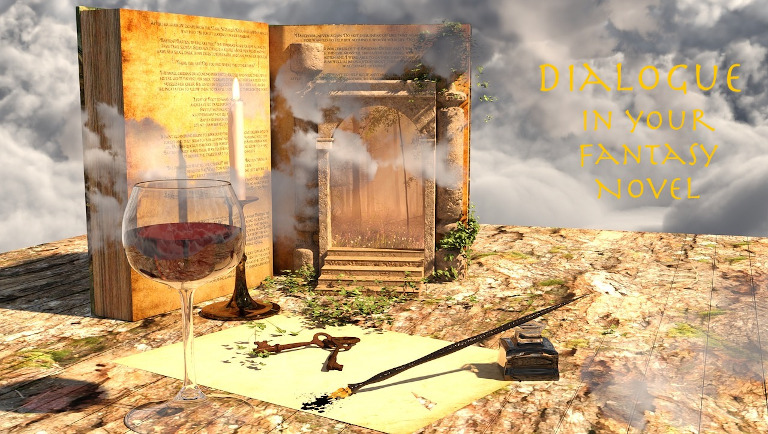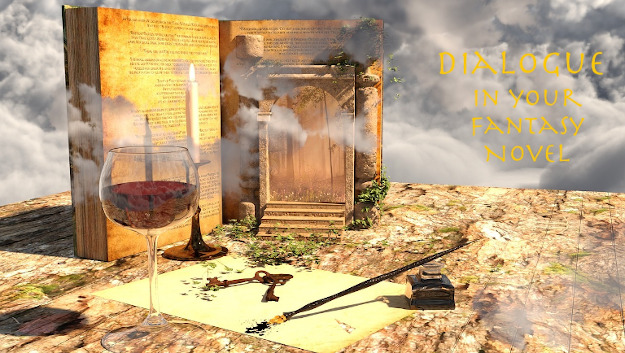
Writing good dialogue is an essential piece of your fantasy novel puzzle. It’s also one area where new writers tend to fall short. In this article you’ll learn why good dialogue is so important, as well as some key guidelines to make sure you get the basics right from the start.
What Dialogue Does for Your Fantasy Novel
You could describe everything that happens in your fantasy novel, but if the characters never speak to each other, readers will quickly lose interest. After all, although we learn a lot when we observe people’s behavior, we also learn a lot by hearing (or reading) how they talk to us and other people. Make no mistake, dialogue is a critical component of character development. When written well, dialogue is what brings your characters to life and makes them more realistic. How the characters talk to each other reveals how they relate to each other.
Writing dialogue is also a great way to clue readers in to how the action of the novel is impacting the characters emotionally. Yes, you can describe all of that, but it’s much more exciting to learn it or tease it out from what the characters say to each other.
When everything is just described from the narrator’s point of view, readers are likely to think that the story is slow. Good dialogue helps keep a good pace in a story, moving the plot forward in ways that are more engaging than long descriptive passages.
A word to the wise: If your fantasy is set in a different time period, you have the challenge of making your dialogue realistic to that time period. Readers quickly pick up on dialogue that doesn’t sound or feel quite right for the time period of the story’s setting. You can also make the language people speak sound “old” without using actual old language with which you are probably not familiar.
Without doubt, the master of this approach is J.R.R. Tolkien in Lord of the Rings. The dialogue of his characters sounds more formal and older without making his characters speak any kind of Old English. In the Fellowship of the Ring, after Gandalf falls in the Mines of Mora, the group is taking refuge in the Elvish stronghold of Lorien. Merry is talking about how horrible the world is outside of his own land of the Shire. Haldir, a resident of Lorien, says this in response:
“The world is indeed full of peril, and in it there are many dark places; but still there is much that is fair, and though in all lands love is now mingled with grief, it grows perhaps the greater.”
The language is normal, but has an older feel to it by the way the words are ordered – syntax. If that’s what you need in your fantasy novel, you’d better read (or re-read) some Tolkien!
He Said/She Said Syndrome When Writing Dialogue
One of the challenges that plagues novice writers has to do with one of the most basic mechanics of dialogue: Identifying the speaker with what are often referred to as taglines. Many writers assume readers will be put off by having too many instances of “he said” and “she said.” Writers who allow themselves to fall down this rabbit hole often tie themselves up in knots trying to come up with variations on he said/she said to avoid repetition – “he exclaimed,” “he opined,” “he retorted,” “he stated,” and on and on and on. These variations can work when employed wisely, but often sound stilted and forced.
We recommend first off that you avoid going down this rabbit hole. For the most part, readers are pretty forgiving around this. Repetition of he said/she said won’t even register with many readers. That said, do try to vary it when you can, but don’t get stuck in forcing variations that sound overly contrived, because readers definitely will notice that.
Play around with putting identifiers before a character speaks. Think about the emotional state of the speaker and how that might help provide variation. And if it’s clear who is speaking without using an obvious identifier, then you might not need one at all. No matter what you do, keep it flowing and realistic.
Punctuation in Your Fantasy Novel Dialogue
One way to make sure you don’t seem like a novice fantasy novel writer even when you are one is to make sure you know how to use punctuation properly in your dialogue. Keep the following in mind:
Most Punctuation Goes Inside the Quote Marks
When writing dialogue and a tagline (speaker identifier) follows the quote, you place a comma inside the quote, and the tagline after the comma does not start off capitalized:
“I just don’t think it’s a good idea,” he said.
In the above example, if you used the character’s name (Jack), then you would capitalize it in the tagine because it’s a proper noun. If there were no tagline, then the sentence spoken by the character would just end with a period inside the quote mark:
Jack was clearly not impressed with the plan. “I just don’t think it’s a good idea.”
Notice how the first sentence serves as a tagline. Yes, you could add another “he said” tagline after what Jack says, but it’s not really needed if these two sentences are kept in the same paragraph.
What if Jack is shouting his line? You’d want to end what he says with exclamation point, right? It goes inside the quote marks, and if there is a tagline after it, you still don’t capitalize it:
“I just don’t think it’s a good idea!” he shouted.
The above variation is one that often throws new writers because they want to capitalize “he” since it feels like a new sentence, but it’s really not – it’s a tagline identifying speaker and should be lower case. Also be sure to keep distinct sentences properly separated:
“I just don’t think it’s a good idea!” he shouted. “You have no idea what you’re up against.”
In the above example, the first quote and tagline form a complete sentence. If the character goes on to add more to what they said in the same paragraph, it starts off as a new sentence, and no tagline is needed because readers already know who is speaking.
When you change who is speaking, always make it a new paragraph! This helps readers keep track of who is saying what.
When the Speaker Quotes Someone Else
If you have a character who is quoting someone else inside the dialogue they’re speaking, the quote is set off with single quote marks:
“But that’s not what he said. ‘I’m going to kill her’ is what he said.”
And if the quote comes at the end of the sentence, you still do it this way, even though what you end up with looks odd because of the quote marks (and the period still goes inside all the quotes at the end):
“But that’s not what he said. His exact words were, ‘I’m going to kill her.’”
Some will say you should put a “thin space” between the ending single and double quote marks, but opinions are divided on the practice.
A Character’s Inner Dialogue/Thoughts
When you have a character whose thoughts you want to reveal – their own inner dialogue, it’s a good idea to set that apart by putting it in italics. Just make sure you’re consistent when you do this.
Jack was doubtful. How can they possibly think this is going to work? I’d be crazy to go along with this, right? Then again, what’s the alternative?
Long Character Quotes
If you have a character who is speaking a significant monologue that involves multiple paragraphs, you would start each paragraph off with a quote mark, but only close off the quote with an ending quote mark at the end of the last paragraph. This is another one that feels weird, but that’s how it’s done. You’ll have multiple paragraphs that each start off with a quote mark, but only the very last paragraph of the monologue has the closing quote mark.
There’s a lot more that can be said about writing dialogue in your fantasy novel, but this is enough to get you started on the right foot!
Try tooleybook, the free tool created for writing books. It takes less than 30 seconds to create an account and start writing.
With tooleybook you can view timelines, chapter purpose, word count, track time and place, tag scenes, move and organize scenes and more...More Info



Your style is so unique compared to other people I have read stuff from.
Thank you for posting when you’ve got the opportunity, I will just bookmark this site.
Thank you very much for your feedback.
Pleasant article I am genuinely enjoying.
It’s awesome to pay a visit this web site and reading the views
of all colleagues about this piece of writing, while I am also keen of getting
experience.